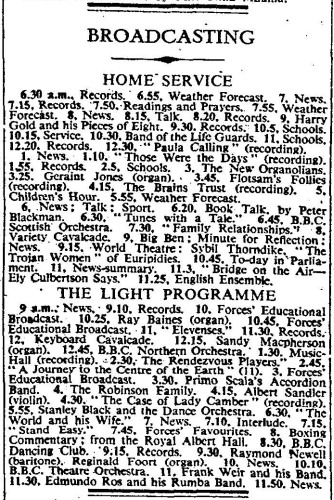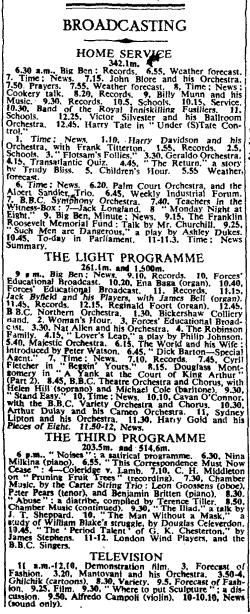- Noises (4 March 1946)
- Noises—Nasty and Nice (1947)
- Moby Dick: A Play for Radio from Herman Melville's Novel (26 January 1947)
- Pytheas: A Dramatic Speculation (25 May 1947)
- The Unblest: A Study of the Italian Poet Giacomo Leopardi as a Child and in Early Manhood (9 May 1949)
- The Monument: A Study of the Last Years of the Italian Poet Giacomo Leopardi (7 March 1950)
- Return to Naples (17 August 1950)
- Canterbury Cathedral: An Exploration in Sound (with Elisabeth Lutyens, 7 November 1950)
- A By-Election in the Nineties (3 March 1951)
- The Dynasts (adapted from Thomas Hardy, 3-9 June 1951)
- Malatesta (translation, Henry de Montherlant, 26 February 1952)
- The Streets of Pompeii (16 March 1952)
- The Great Desire I Had: Shakespeare and Italy (26 October 1952)
- Westminster Abbey (with Elisabeth Lutyens, 1953)
- A Very Great Man Indeed (7 September 1953)
- All for the Best (translation, Luigi Pirandello, 22 November 1953)
- The Private Life of Hilda Tablet: A Parenthesis for Radio (24 May 1954)
- Hamlet; or, The Consequences of Filial Piety (translation, Jules Laforgue, June 20 1954)
- The Battle of the Masks (translation, Virginio Puecher, 6 September 1954)
- The Queen and the Rebels (translation, Ugo Betti, 17 October 1954)
- Emily Butter: An Occasion Recalled (14 November 1954)
- The Burnt Flower-Bed (translation, Ugo Betti, 23 January 1955)
- Vincenzo: A Tragicomedy (29 March 1955)
- Holiday Land (translation, Ugo Betti, 5 June 1955)
- A Hedge, Backwards (29 February 1956)
- Crime on Goat Island (translation, Ugo Betti, 7 October 1956)
- Don Juan in Love (translation, Samy Fayad, 5 November 1956)
- Alarica (translation, Jaques Audiberti, 22 September 1956)
- Irene (translation, Ugo Betti, 20 October 1957)
- Corruption in the Palace of Justice (translation, Ugo Betti, 19 January 1958)
- The Auction Sale (poem, 20 September 1958)
- The Primal Scene, As It Were: Nine Studies in Disloyalty (11 March 1958)
- Not a Drum Was Heard: The War Memoirs of General Gland (6 May 1959)
- One Flesh (translation, Silvio Giovaninetti, 12 June 1959)
- The Land Where the King Is a Child (translation, Henry de Montherlant, 3 October 1959)
- Musique Discrète: A Request Programme of Music by Dame Hilda Tablet (with Donald Swann, 27 October 1959)
- The House on the Water (translation, Ugo Betti, 3 February 1961)
- A Hospital Case (translation, Dino Buzzati, 22 November 1961)
- The America Prize (translation, Dino Buzzati, 18 June 1964)
- Zone 36 (translation, Dino Buzzati, 22 March 1965)
- The Complete Lessons of the War (poems, 14 February 1966)
- The Advertisement (translation, Natalia Ginzburg, 24 September 1968)
- Summer (translation, Romain Weingarten, 3 October 1969)
- The Two Mrs. Morlis (translation, Luigi Pirandello, 8 November 1971)
- The Strawberry Ice (translation, Natalia Ginzburg, 21 January 1973)
- Room for Argument (translation, Luigi Pirandello, 7 January 1974)
- The Wig (translation, Natalia Ginzburg, 23 March 1976)
- Like the Leaves (translation, Giuseppe Giacosa, 24 May 1976)
- Duologue (translation, Natalia Ginzburg, 3 January 1977)
- The Soul Has Its Rights (translation, Giuseppe Giacosa, 22 June 1977)
- Sorrows of Love (translation, Giuseppe Giacosa, 23 October 1978)
- Moby Dick (new production of 1947 play, 2 February 1979)
- I Married You for Fun (translation, Natalia Ginzburg, 7 January 1980)
|
Working from the (somewhat incestuous) bibliographies in British Radio Drama, Contemporary Authors, Contemporary Poets, and The Dictionary of National Biography, here's a nearly complete list of Henry Reed's writing for radio, including his translations from French and Italian (but not his talks or criticism):
Is this the humble beginning of Henry Reed's writing career with BBC radio?
Roger Savage, writing in the book British Radio Drama (1981), says Reed's first original writing for radio was a 1946 piece called Noises, produced first in a fifteen-minute version for an interlude between programs, and then extended to a full half-hour. Martin Armstrong, in The Listener, described the piece as a short essay on the psychology of noises in which noises were used to play, wittily and suggestively, on the imagination of the listener (November 28, 1946). British Radio Drama includes a bibliography of Reed's radio plays and the dates of their premieres—Noises is listed as having first aired on the BBC on March 4, 1946: As you can see, the only "Interlude" scheduled is a five-minute break on the Light Programme at 7:10 p.m., although there is a fifteen-minute "Forces' Favourites" at 7:45 which could be a candidate. The extended version of Noises which Armstrong reviewed for The Listener was broadcast later that year, on November 18, 1946, at 6:00 p.m. By that time, the Third Programme had been created, and the piece had earned a subtitle (as many of Reed's plays would) "A satirical programme": Unfortunately, in some books the play is also listed as Noises On (as in the opposite of "noises off-stage"), and the longer version as Noises—Nasty and Nice, causing me all sorts of difficulties in searching and pinning down dates and times.
|
||||||||||||||||||||||||
|
|
|||||||||||||||||||||||||









